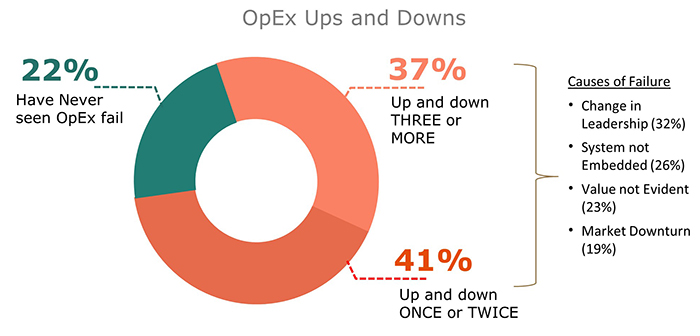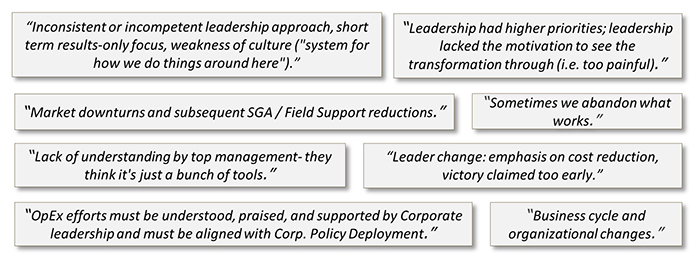Sustaining Operational Excellence
Sustaining Operational Excellence: This is an excerpt from the Kaufman Global survey report. For the full report, follow the link at the bottom of this page.
We conducted a survey about sustaining operational excellence. For the survey, we contacted over 100 executives in our network who have deep experience leading operations and operational excellence efforts. Our goal was to examine how organizations are evolving in their construction, use of and thinking about OpEx today. 16 key topics were covered, with Sustainability being one of them. For this section, we wanted to find out how many of the respondents had experienced OpEx build-up and tear-down and, we wanted to learn something about why.
Q: How many times in your career have you seen OpEx efforts built up to a significant level, and then be killed off by the organization (that is, resources retracted, timing deferred, “overhead” cut, unit leaders subvert or ignore it, etc.)?

THE DATA: 78% of the population surveyed have seen OpEx fail at least once and a staggering 37% at least three times in their career.
KG POV: The data gives us an indication of how often OpEx fails. The answer is… a lot. It’s easy for organizations to get distracted. For those of you who have not experienced an OpEx failure, consider yourselves lucky. For those of you who have, you’ll appreciate the consistency of participant comments (subset below) from multiple enterprise types about the reasons why.

In looking at all the comments submitted around this question, four themes emerged as reasons for failure (see list to right of the pie chart). They are: Change in Leadership, System not Embedded, Value not Evident (Relevance) and Market Downturn. It’s interesting to note the fairly even distribution of reasons by category. When you pair that with the high rates of failure overall, it tells us that if the system is weak, almost anything can kill it.
If you would like to receive a copy of the full report that includes all 16 topic areas, register and download here: An Examination of Operational Excellence





